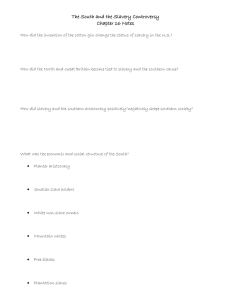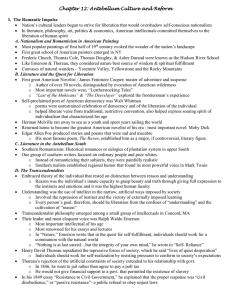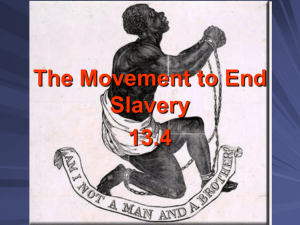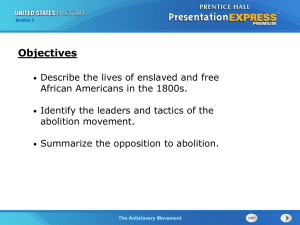12.2 worksheet
advertisement
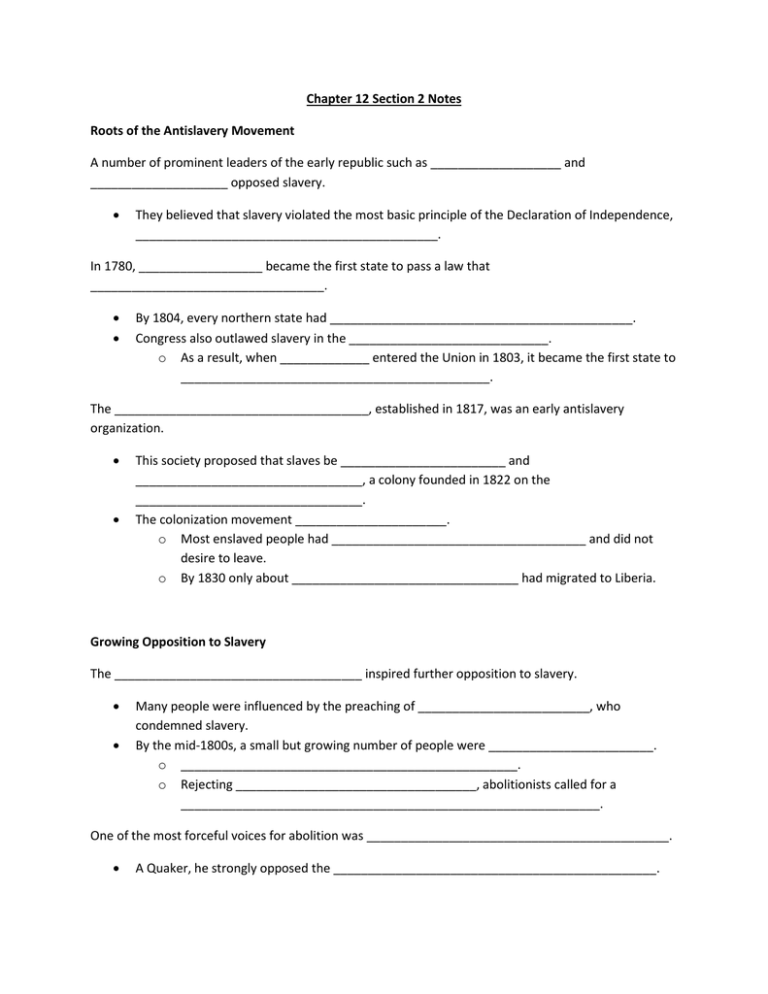
Chapter 12 Section 2 Notes Roots of the Antislavery Movement A number of prominent leaders of the early republic such as ___________________ and ____________________ opposed slavery. They believed that slavery violated the most basic principle of the Declaration of Independence, ____________________________________________. In 1780, __________________ became the first state to pass a law that __________________________________. By 1804, every northern state had ____________________________________________. Congress also outlawed slavery in the _____________________________. o As a result, when _____________ entered the Union in 1803, it became the first state to _____________________________________________. The _____________________________________, established in 1817, was an early antislavery organization. This society proposed that slaves be ________________________ and _________________________________, a colony founded in 1822 on the _________________________________. The colonization movement ______________________. o Most enslaved people had _____________________________________ and did not desire to leave. o By 1830 only about _________________________________ had migrated to Liberia. Growing Opposition to Slavery The ____________________________________ inspired further opposition to slavery. Many people were influenced by the preaching of _________________________, who condemned slavery. By the mid-1800s, a small but growing number of people were ________________________. o _________________________________________________. o Rejecting ___________________________________, abolitionists called for a _____________________________________________________________. One of the most forceful voices for abolition was ____________________________________________. A Quaker, he strongly opposed the _______________________________________________. Garrison was more ______________ than many others, because he favored _____________________________________ for all African Americans. In 1831, Garrison launched an _________________________________ called the _____________________. o It became the nation’s leading antislavery publication for 34 years, ending only when ____________________________________. Garrison cofounded the _______________________________________________, which later became the ______________________________________. o Leaders of this group included ___________________________, a minister who had been a pupil of ___________________________. Weld brought the zeal of a ________________________________ to antislavery rallies. o Other members included _______________________________________, daughters of a _________________________________________. Prominent _____________________________ in the North took a leading role in the abolitionist movement. In 1829, _________________________ published his Appeal: To the Coloured Citizens of the World. o This strongly worded pamphlet urged enslaved people to _________________________________________________. Perhaps the most powerful speaker for abolitionism was _______________________________. o Born into slavery, Douglass had broken the law by ______________________________. o He later ______________________________________________. o Garrison and other abolitionists encouraged Douglass to _____________________________________________________. o By appearing in public, Douglass risked being _______________________________. Yet he continued to speak before _____________________________________. o He also published his own antislavery newspaper, ______________________________. Abolitionists won the support of a few _____________________________. Former President ______________________________, now a member of _________________, read _____________________________________ from the floor of the House of Representatives. o In 1839, Adams proposed a constitutional amendment that would ___________________________________________________. However, the amendment was ________________________. o Two years later, Adams made a dramatic stand against slavery. Captive Africans aboard the slave ship ________________ had rebelled, _________________________ and ordering the crew to ________________________________. Instead the crew _______________________________________. Adams spoke to the ___________________________ for nine hours and helped the captives _____________________________________. The Underground Railroad Some courageous abolitionists dedicated themselves to _______________________________________. They established a system known as the ____________________________ o Despite its name, it was neither ___________________ nor a ____________________. o It was a network of people-________________________________________________who secretly _______________________________. Working for the Underground Railroad was ___________________________________. o _____________________ led fugitive slaves from one ________________ to the next. Stations were usually the ______________________________________, but might be _________________________________. o Supporters helped by donating _______________, _____________, or ______________________________________________________________. o Many people ___________________________ to help runaway slaves. ____________________, and Indiana Quaker, assisted more than ________________________. _____________________, who had herself escaped from slavery, escorted more than _________________ to freedom via the Underground Railroad. o Tubman was nicknamed the ___________________ after the biblical leader who led the __________________________________________. o She proudly told Frederick Douglass that, in 19 trips to the South, she ________________________________. o Slave owners promised a ___________________________________________. Each year, hundreds of slaves moved along the Underground Railroad to freedom in the ____________________________________. o In total, perhaps as many as ______________ gained their freedom this way. Opposing Abolition Abolitionists faced ____________________________ in the North as well as the South. Many northerners _______________________________________________________. o Northern ________________________________________ relied on the ______________________________________________. o Northern workers feared that freed slaves might come north and _____________________________. Such fears sometimes prompted ________________________________________. o Mobs attacked ___________________________________. o In 1835, William Lloyd Garrison was ___________________________________________________________________. Southerners had long defended slavery as a _____________________________. o Now as support for abolition grew louder, they ________________________________. The state of Georgia offered a __________________ for the __________________________________ of William Lloyd Garrison. Southerners in Congress won passage of a ________________________________________________________. ___________________________ unsuccessfully fought for the ________________________________.
